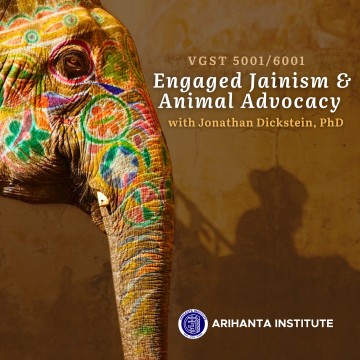Engaged Jainism & Animal Advocacy
Engaged Jainism & Animal Advocacy
Course VGST50016001
How do the core Jain values of ahiṃsā (nonharming), aparigraha (nonpossessiveness), and anekāntavāda (non-one-sidedness) relate to the ethics and practices of animal protection and advocacy? Jains have insisted on the practice of vegetarianism for millennia, but what else might a proactive “Engaged Jainism”' involve? Is vegetarianism sufficient on the dietary level? Is veganism sufficient? Why or why not?
Part One of the course explores sites of institutionalized and corporate hiṃsā (harm) towards animals, focusing specifically on industrialized animal agriculture. The purpose of this—at times vivid—investigation is to begin to comprehend just how harmful these anthropogenic phenomena are for both the animals and humans contained therein. Part Two pivots to how Jainism—past, present, and future—interfaces with these phenomena. The focus will be on the Jain ethic of nonharming, how it determines dietary practices, but also specifically how it might motivate an “Engaged Jainism” that extends well beyond what one does and doesn’t eat. Part Three looks into past and contemporary animal advocacy movements and social justice activism more broadly understood. This part will look at the diversity of principles, targets, and tactics employed by these various movements. Specifically we will explore how these movements invoke nonviolence as the guiding force behind their educational, legal, political, entrepreneurial, and grassroots activist efforts to address the plights of animals.
Upon successful completion of this class, students will be able to:
- Broadly chart the main features of contemporary industrial animal systems.
- Identify mainstream perspectives on animal use and consumption.
- Connect Jain and Non-Jain philosophy to practice (“applied ethics” and “Engaged Jainism”).
- Understand common forms of animal advocacy and activism and the debates surrounding them.
- Describe ethical contestations within Jain communities as they engage the questions of how advocacy and activism relate to ahiṃsā, noninterventionist. interpretations of karma theory, the validity of alternative views (nayas), and the lived lay realities of cultural “integration.”
Learning Area
 Animal Advocacy & Biodiversity
Animal Advocacy & Biodiversity Instructor
 Jonathan Dickstein, PhD
Jonathan Dickstein, PhD
Jonathan Dickstein, PhD, the Tirthankara Shreyansanath Endowed Assistant Professor of Jain and Vegan Studies at Arihanta Institute, specializes in South Asian Religions, Religion and Ecology, and Comparative Religious Ethics. He received his doctoral degree in Religious Studies from the University of California, Santa Barbara, where he wrote his dissertation on ancient Indian animal taxonomies and their relevance for religious ritual and dietary practice. Jonathan’s current work focuses on Jainism and contemporary ecological issues, and accordingly extends into Critical Animal Studies, Food Studies, and Diaspora Studies.
Jonathan has published in a wide array of interdisciplinary journals on topics such as veganism and politics, yoga and diet, Jain veganism, and the ethic of nonviolence (ahiṃsa). Jonathan considers himself a scholar-practitioner, having spent many years not only in libraries but also in public advocating for justice for both humans and nonhumans alike.
Jonathan has published in a wide array of interdisciplinary journals on topics such as veganism and politics, yoga and diet, Jain veganism, and the ethic of nonviolence (ahiṃsa). Jonathan considers himself a scholar-practitioner, having spent many years not only in libraries but also in public advocating for justice for both humans and nonhumans alike.
Reviews
5/5 - Amazing
 Amazing experience during the class sessions"
Amazing experience during the class sessions"Enrollment Options
14-DAY FREE TRIAL
- Free, unlimited access to our self-paced courses for 14-days.
- Already used your free trial? Enroll in our Monthly or Annual Membership options at anytime and continue learning immediately!
MONTHLY MEMBERSHIP
- $45 USD / Month
-
Immediate access to course
#### | Name. - Unlimited access to our live and self-paced courses for one month, with month-to-month auto rollover.
- Excludes graduate seminars, language courses, and courses hosted on partner platforms.

